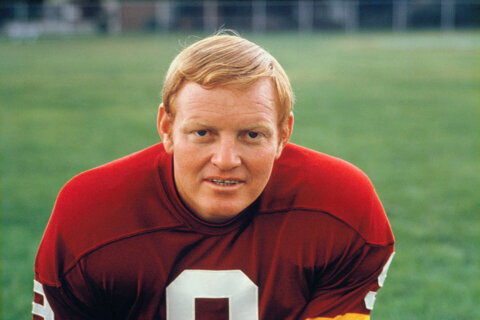As compelling as the NFL’s version of the Elite Eight was Sunday, the most breathtaking thing to happen in pro football took place off the field.
There’s a really messy divorce playing out in Houston, where star quarterback Deshaun Watson apparently wants out of a dysfunctional Texans organization that may have supplanted Washington as the NFL’s most toxic.
“[The situation between Deshaun Watson and the Houston Texans] is worse than what’s being reported. It’s worse than what can be said on television.”
—@danorlovsky7 pic.twitter.com/vWjsNjNLJG
— Get Up (@GetUpESPN) January 18, 2021
The reasons for this inevitable split are nuanced and, frankly, for the purposes of this column, irrelevant. The bottom line is, one of the five best quarterbacks in the league is likely available to anyone bold enough to make the blockbuster deal of the century.
The case for the Burgundy and Gold going all-in on Watson is simple: Washington was a quarterback away from dominating the NFC East in 2020, maybe even beating the Tampa Bay Buccaneers and making a deep playoff run in a wide-open conference. But let’s delve into how realistic a Watson-to-Washington trade really is.
Trade compensation
This is perhaps the biggest hurdle Washington would have to clear.
Jay Cutler cost two first round picks and a third-rounder. Robert Griffin III cost three first-rounders and a second-round pick before he even played a down of NFL football. What would it take to get a three-time Pro Bowler coming off a career year?
Watson is one of four quarterbacks in NFL history to throw for more than 4,500 passing yards, more than 30 touchdowns, fewer than 10 interceptions and average more than 8.5 yards per pass. And Watson is the only one to do so for a losing team.
Deshaun Watson finishes the season with an NFL-high 4,823 Pass yards but a 4-12 record.
He’s the first player to lead the NFL in pass yards with 12+ losses since Jeff George for the 1997 Raiders pic.twitter.com/U85pP9t7ay
— ESPN Stats & Info (@ESPNStatsInfo) January 4, 2021
So, if Houston is smart (and that’s up for debate, since they alienated Watson to begin with), they start the bidding at four first-round picks for a generational QB talent entering his prime. Maybe that comes down to two first-rounders if you throw in an established Pro Bowl-caliber player or two.
In that scenario, it makes a lot of sense for Washington to offer two first-rounders, a conditional mid-round pick and, say, Matt Ioannidis and/or Montez Sweat. I’d pull the trigger on that and light a stogie in celebration if I’m Ron Rivera.
However, the wild card is the no-trade clause in Watson’s contract, which gives him full control over where he’s dealt. Miami appears to be the early front-runner but if Houston allows Watson to talk to other teams, perhaps Rivera could sell him on the culture and young nucleus in Washington. If anyone can get a single 25-year-old to pick cold D.C. winters over taking his talents to South Beach (where there’s no income tax, by the way), it’s Rivera.
The Dolphins can offer something else Washington can’t: multiple first-round picks in the upcoming draft. The Texans don’t have picks in the first or second rounds (ironically, because of a trade with Miami for Laremy Tunsil), leaving Houston more likely to want their draft capital replenished than taking members of Washington’s vaunted defensive line off their hands before the Football Team has to decide who they can afford. From that standpoint, it probably puts Washington behind the Dolphins, and perhaps the New York Jets, in the Watson sweepstakes.
Salary cap cost
Watson signed the second-richest contract in NFL history before this past season, so his salary will be every bit as steep as the trade compensation to get him. Houston has already paid out most of his guaranteed money, but Watson has high base salaries for the rest of his four-year, $156 million contract extension. Yes, his $10.5 million salary in 2021 is a bargain (largely because of the leaguewide salary cap reduction expected this year due to the pandemic) but that balloons to $35 million in 2022 and averages $33.6 million per year thereafter.
That’s top-of-market value, and certainly fair for a player of Watson’s caliber, but in successive seasons, Washington will have to write big checks to keep Jonathan Allen, DaRon Payne, Terry McLaurin and Chase Young. Acquiring Watson will significantly impact Washington’s ability to do that.
Injury history
Watson has twice torn ACLs — his left knee in college seven years ago, and his right knee, which drastically cut short his promising rookie season in 2017 — and while he’s shown great durability and toughness the last three seasons (he’s missed only one game and famously threw a touchdown after getting kicked in the eye last year), there’s an inherent risk in betting so much on one player.
Washington is still dealing with the fallout from the worst-case scenario under such a gamble. Alex Smith also had a significant injury history before his leg was horribly destroyed in only his 10th game with the team. Now, Washington is hamstrung with his unwieldy contract while they actively try to replace him. And we all remember how long it took to recover from the RG3 trade — mainly because Washington really hasn’t yet.
Rivera (and whoever lands the general manager job) will have to decide which bet is riskier: Going all in on an established star player or gambling that they’ll find a star of their own in the draft within the next year or two. It’s a choice that will affect this franchise for decades.
The take-away
Maybe it’s years of witnessing the comedic cavalcade of quarterbacks that rotated in and out of Burgundy and Gold jerseys the last two decades, but Watson-to-Washington feels more like a pipe dream than a lifeline. Drew Brees landing in New Orleans in 2006 might be the only real example of an already-elite quarterback falling into the lap of a woebegone franchise in dire need of him.
Washington had a fine first step in Rivera’s rebuilding effort by winning the NFC East, but this team is still very much a work in progress — too much so to give in to the temptation to bet the farm on Watson. A gamble involving three or four first-round picks only makes sense for a team already in a championship window that needs an elite QB to get over the hump (like, say, the 49ers, or the Saints if/when Brees retires). Watson coming here now at that cost would essentially make Washington what Houston was under Bill O’Brien: Good enough to win a few division titles but ultimately not good enough to win more than once in the postseason.
Rivera is trying to build something greater. As much as we’d all love to have a must-see-TV quarterback in Washington, the best avenue for the Burgundy and Gold is most likely continuing to build the entire team and finding their own Deshaun Watson in the draft.








